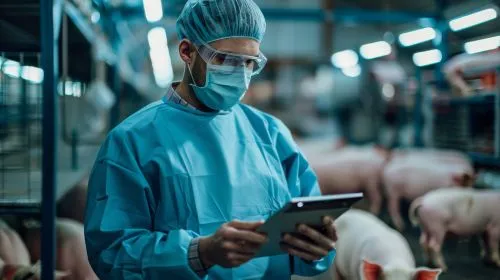1273

The world is not a stable place. Conflicts, both civil and international, as well as deglobalization and the future threat of climate change, are just a few of the things that have the potential to disrupt the food system radically. At the City Food and Drink Lecture in Guildhall, London, biologist Sir Charles Godfray spoke about the successes and challenges of feeding the world, concluding that global food security will be affected by wars, deglobalization, and climate change, according to FoodNavigator.
A highly esteemed expert
Sir Charles Godfray is a biologist and the director of the Oxford Martin School. He has published works in ecology, evolution, and epidemiology and has a particular interest in how the world's food system will need to adapt to address challenges such as climate change.
At the City Food and Drink Lecture in Guildhall, London, Godfray discussed the tremendous progress made in recent decades in lifting people out of poverty and helping them eat well.
He also warned of future challenges for the global food system, such as instability and military conflict, the perils of deglobalization, and climate change.
Education, wealth, and population growth
One of the biggest factors in being able to feed the world is the awareness of the increasing number of mouths to feed. The world's population has recently reached eight billion, of course.
As a biologist, Godfray is optimistic about how well population and its causes are now understood. "Probably the most extraordinary thing in my adult intellectual life," he said, "is that we now know that if we take people out of poverty, if we educate children, especially girls, if we provide access to reproductive healthcare, then human fertility, fecundity, decreases."
However, a wealthier world is not without challenges. "When populations become wealthier," Godfray emphasized, "they demand more meat, they demand other foods that require more resources to produce. We will see an increase in food demand in this century.
"So, the extra calories we have to produce to feed that population of about 10 billion is somewhere in the range of a 30% to 60% increase over what it is now."
Sustainable intensification
This, Godfray suggested, presents some challenges. "My personal view," he said, "is that we should try to increase the amount of food we produce to meet this global demand and, in fact, do something good for the economy.
"In fact, we can produce more food, we can have better biodiversity, and we can use the land for other things, such as carbon capture, such as climate action."
Ultimately, Godfray recommended sustainable intensification, meaning increasing production on agricultural land using sustainable methods.
"That has all sorts of different components," he said. "It has genetic intensification, it has ecological intensification of breeding, using many of the insights from non-traditional agricultural practices anchoring regenerative agriculture.
"It will be associated with high-intensity farming, high yield... There will be other times within the same farm where we have a very multifunctional approach, producing some food but sacrificing some crops, for example, for biodiversity."
Conflicts and hunger
Despite this optimism, hunger and malnutrition are not decreasing in many parts of the world.
"We have problems with increasing numbers of people who are very hungry," Godfray said. "But if you look at where these people are, they are mostly in areas where there is civil or international conflict."
According to Action Against Hunger, a non-governmental organization, the six countries where hunger is most severe are Afghanistan, Nigeria, Ethiopia, Somalia, South Sudan, and Yemen - all of which are or have recently been involved in armed conflicts, including both official wars and insurgencies.
Godfray asks, "What are the problems within the food system and what are the problems, in this case, associated with geopolitics?"
The threat to the food system
The food system significantly contributes to climate change. According to Godfray, even if we eliminate all other causes of climate change, the global food system would still push us beyond the 1.5-degree Celsius warming threshold, which would cause significant damage to the planet.
However, for over a billion people worldwide, animal agriculture provides their livelihoods. Without it, many would not survive. Godfray understands that a compromise needs to be made between reducing meat and dairy production and supporting the livelihoods of those who depend on it.
"This is an unpopular view," Godfray said, "but if we have any hope of globally getting to net-zero, we need to eat less meat and dairy. And I think we need to do that with a narrative that is non-judgmental.
And we need to consider the people whose livelihoods depend on dairy and animal production right now. We should look at alternative income streams that can be linked to those farms."
Deglobalization of the food system?
According to Godfray, we are in a period of deglobalization, of the fragmentation of a supply chain that once spanned the globe.
"We have to be really sure that the global food system is resilient to the shocks that could be thrown at it," Godfray warns.
"We're going through a period of deglobalization. Now deglobalization is possible for, say, semiconductor production, you can build a plant in China, the United States, or Europe.
"You have to be able to move that Argentine wheat somewhere else. We have to have a globalized food system. And I worry about some of the corollaries of deglobalization in other areas, other areas may have transaction costs that make the global food system less reliable."




